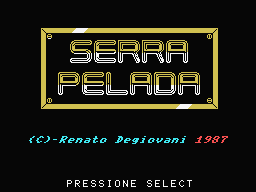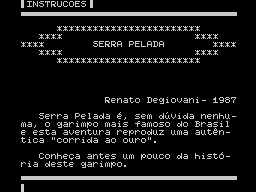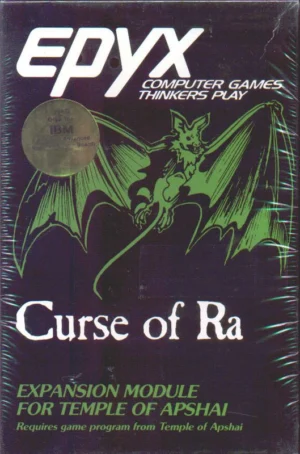Retro Replay Review
Gameplay
Serra Pelada delivers a rich text-adventure experience that plunges you into the frantic world of Brazil’s 1980s gold rush. You begin with only basic supplies and a gritty determination, and over the course of eight in-game days, you must explore, negotiate, and strategize your way to discovering the legendary “Foreign Debt” nugget. Time management is crucial: the faster you navigate the events of each day—using commands like ANDAR (walk), EXAMINAR (examine), or MAPA (map)—the more opportunities you’ll have to uncover hidden veins of gold and gather essential tools.
One of the game’s most distinctive gameplay features is its limited parser, which recognizes pronouns but does not allow chaining of complex commands. This constraint lends an authentic old-school flavor, forcing you to think through each action step by step. You’ll find yourself carefully planning sequences—purchasing a shovel, then returning to a promising site, then panning for gold—all while keeping an eye on your dwindling daylight and resources. It can be challenging at first, but mastering the parser becomes part of the satisfaction.
Serra Pelada also incorporates a rudimentary but effective economy system. Once you’ve unearthed gold, you can sell your findings to raise funds for better equipment, provisions, or bribes to local characters. This dynamic creates a feedback loop: the more you invest in supplies, the easier it is to dig deeper, avoid hazards, and outmaneuver thieves. Balancing risk and reward—choosing when to sell and when to push on in search of the ultimate prize—keeps the gameplay engaging from your first shovel strike to the final suspenseful hours.
Graphics
As a pure text adventure, Serra Pelada forgoes graphical representation in favor of vivid prose. Each locale is described in detail, from the sun-bleached ridges of the naked mountain range to the rickety makeshift encampments of fellow prospectors. These textual descriptions rely on your imagination but are peppered with sensory details—hammering rocks, dusty air, the glint of a gold speck—that bring the environment to life.
While there are no visual maps embedded in the game’s interface, the optional “MAPA” command generates a segmented ASCII-style overview of your current surroundings. It may not be a high-resolution image, but it’s an invaluable orientation tool in a sprawling open-air site littered with hazards and treasure sites. You’ll quickly learn to correlate textual cues with map segments, developing a mental image of ridges, ravines, and key landmarks.
The lack of traditional graphics is a double-edged sword: it demands more imaginative investment but also frees up the narrative to convey atmosphere and tension directly. There are no sprites to admire or animations to interrupt your flow—every moment is focused on interpretation and decision-making, which veteran text-adventure fans will appreciate for its unbroken immersion.
Story
Serra Pelada draws its dramatic tension from the real-life tale of João Dente-de-Ouro, the miner who struck a colossal 154-pound nugget during Brazil’s gold rush era. The locals christened this behemoth the “Foreign Debt,” a fitting symbol of both wealth and the heavy burdens it can carry. As you step into João’s boots, you experience the charged atmosphere of 1980s prospecting: the camaraderie of fellow diggers, the ceaseless quest for fortune, and the ever-present risk of betrayal or disaster.
Throughout your eight-day journey, glimpses of the true historical context emerge in snippets of dialogue and setting descriptions. You might overhear characters speculate about João’s mysterious disappearance, or notice wary glances exchanged when someone mentions safety and trust. This weaving of fact and fiction adds a layer of intrigue, making you wonder if you, too, will vanish under the weight of your ambitions.
The narrative doesn’t spoon-feed every detail; instead, it offers breadcrumbs that encourage exploration. Who can you bribe for a shortcut through treacherous terrain? Which abandoned camp might hide forgotten tools? The story’s open-endedness is its strength: it invites multiple approaches, and every playthrough can reveal new angles on the mystery at Serra Pelada’s heart.
Overall Experience
Serra Pelada stands as a testament to the power of text-based gaming. Its minimalistic interface hides a complex simulation of survival, negotiation, and historical intrigue. For newcomers to interactive fiction, the eight-day time limit and restricted parser may present a steep learning curve, but those willing to engage with its mechanics will find a deeply rewarding challenge.
Long-time fans of Renato Degiovani’s work will appreciate the consistency in design and the improvements over his previous title, Amazônia. The optional accentuation of Portuguese words demonstrates a thoughtful nod to accessibility, ensuring a broader audience can enjoy the game without stumbling over diacritics. Meanwhile, the map feature and economy system represent meaningful enhancements that make navigation and resource management more intuitive.
In the end, Serra Pelada is more than a text adventure—it’s an evocative journey into a pivotal moment in Brazilian history. Its blend of tight gameplay, atmospheric storytelling, and strategic depth offers hours of engrossing entertainment. Whether you’re drawn by the allure of striking gold or the pull of an unresolved mystery, this title delivers a uniquely immersive experience that will linger in your thoughts long after the final in-game sunset.
 Retro Replay Retro Replay gaming reviews, news, emulation, geek stuff and more!
Retro Replay Retro Replay gaming reviews, news, emulation, geek stuff and more!








Reviews
There are no reviews yet.